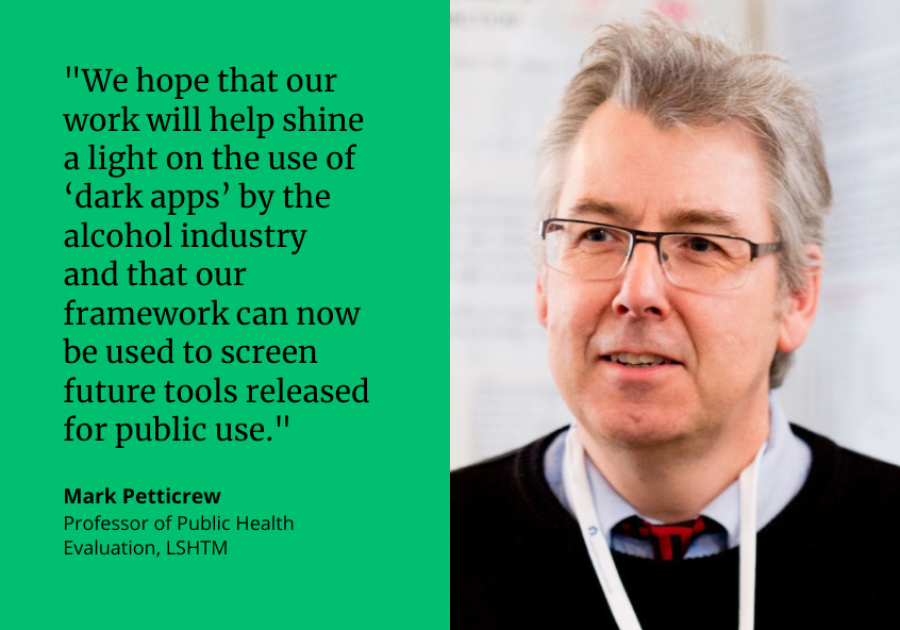Industry-funded alcohol-reduction apps contain misinformation, study warns
11 October 2024 London School of Hygiene & Tropical Medicine London School of Hygiene & Tropical Medicine https://lshtm.ac.uk/themes/custom/lshtm/images/lshtm-logo-black.png
“We hope that our work will help shine a light on the use of ‘dark apps’ by the alcohol industry and that our framework can now be used to screen future tools released for public use.” Mark Petticrew, Professor of Public Health Evaluation, LSHTM
Alcohol industry-funded apps may use covert ‘misinformation strategies’, omit important public health information and could ‘nudge’ users towards drinking more alcohol, new research has found.
The study, led by researchers from the London School of Hygiene & Tropical Medicine (LSHTM), is the first to analyse digital tools funded by the alcohol industry, which claim to provide alcohol-reduction advice.
The findings are published in Health Promotion International.
It compared 15 web-based or mobile apps promoted by alcohol industry-funded organisations, including Drinkaware, Drinkwise, Cheers! and Educ’Alcool, with 10 digital tools promoted by national governments or healthcare services, such as Drink Free Days from the UK's National Health Service (NHS). Tools across the UK, Ireland, USA, Canada, New Zealand and Australia were included.
The team did not identify misleading information tactics in any nationally-approved tools, whereas all but one alcohol industry-funded tool was found to omit, distract or dilute some risk information. The researchers have labelled these ‘dark apps’ – apps which intentionally distorts a user’s perceived risk of alcohol-related harms without their knowledge, in a direction which is favourable commercially and opposite to the user’s wishes.
The findings suggest that messaging used in industry-funded tools could potentially distort the health information provided and ‘nudge’ users towards increasing their consumption, which the researchers describe as covert ‘misinformation strategies’ and misleading app designs, referred to as ‘dark patterns’.
Compared with non-industry funded tools approved by national governments or healthcare services, these ‘dark apps’ were three times less likely to inform users of the increased cancer risk associated with alcohol (33% vs 90% for nationally-approved apps).
Only 53% informed users of standard drink sizes, 60% of weekly limits and 40% of groups who should avoid alcohol, such as those who may be pregnant. Around half (53%) did not clearly tell users if they were drinking above guideline limits.
Examples of potentially problematic messaging identified by the researchers included:
“In Ireland, binge drinking is widely considered to be the norm – 74% of Irish adults believe that excessive drinking is ‘just a part of Irish culture.” (Drinkaware Ireland)
“Stay safe and social by drinking no more than one standard drink an hour to keep your blood alcohol levels a bit lower.” (Cheers!)
“Moderate, regular drinking is sometimes associated with the reduced risk of certain diseases” (Éduc’alcool)
The team call for public and health practitioners to be warned about the tactics employed by some alcohol industry-funded tools, similarly to current regulations which advise against tobacco industry-funded apps, and for only independent health sources such as the NHS to be promoted. The findings are consistent with previous research, which has shown that alcohol industry-funded health education materials from the same organisations include significant misinformation, particularly on cancer risk.
Dr Elliot Roy-Highley, co-author of the paper who worked on the research as an MSc Public Health student at LSHTM and is now a Public Health Registrar at Royal Free London, said: “Over the past few years, government bodies, such as the UK’s NICE, have advised healthcare practitioners and services to avoid tobacco industry-funded digital interventions and we believe it’s important that this is now extended to include the alcohol industry.
“In our study, we found evidence of cultural targeting and peer pressure messaging, all the way up to obfuscating the proven risks of excessive alcohol consumption with blatant misinformation.
“The public need to know the risks associated with the use of alcohol industry-funded apps and platforms which host these tools must work to remove apps which have been shown to contain misinformation.”
Professor Mark Petticrew, co-author of the paper and based at LSHTM, said: “Through our study, we found that some alcohol industry-funded apps exploit ‘dark patterns’ to deliberately mislead users who want to drink less, into continuing or increasing the amount of alcohol they drink.
“We hope that our work will help shine a light on the use of ‘dark apps’ by the alcohol industry and that our framework can now be used to screen future tools released for public use.”
Publication:
Elliott Roy-Highley et al. Dark patterns, dark nudges, sludge and misinformation: alcohol industry apps and digital tools. Health Promotion International. DOI: 10.1093/heapro/daae037
If you enjoyed this article and would like to build a career in global health, we offer a range of MSc programmes covering health and data, infectious and tropical diseases, population health, and public health and policy.
Available on campus or online, including flexible study that works around your work and home life, be part of a global community at the UK's no.1 public health university.